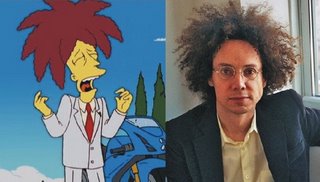Hipster Sociology

A couple weeks ago I zipped through two of the hottest pop-sociology books. Levitt and Dubner's Freakonomics (2005) and Malcolm Gladwell's The Tipping Point (2000).
Freakonomics is a collection of interesting observations, and a lot of it is backed up with studies and data (Hey there's a free manuscript version here). This is the book that made waves last year for promoting the possibility that the drop in crime in the U.S. in the 90s was due to legalized abortion in the 70s. There's lotsa other neat stuff in there, bu what the book needs are some graphs. If I could sum up the book in a sentence it would be : "Correlation does not imply causation". Although at times it gets dangerously close to making the argument that "Stronger correlation implies causation".
Gladwell's book is a relative lightweight. The Tipping Point story goes something like this: With any phenomena there are the mavens who are the first to learn about it, the connectors who are able to spread it and how well the phenomena catches is a function of the stickiness to the idea.
 The book feels dated right from the first page; Gladwell uses the example to the sudden popularity of Hush Puppies. (Mid-90s Hush Puppies came out in styin' colours and they were hot with the proto-hipsters. they're too wimpy for Cdn. weaher so they never were very popular here). Hardly anyone even remembers that. He uses this as his primary example and he keeps coming back to it. It was stupid of him to stake his thesis on such a lame (and ephemeral) example. It's like someone's high school essay about Depeche Mode lyrics -- seemed profound at the time.
The book feels dated right from the first page; Gladwell uses the example to the sudden popularity of Hush Puppies. (Mid-90s Hush Puppies came out in styin' colours and they were hot with the proto-hipsters. they're too wimpy for Cdn. weaher so they never were very popular here). Hardly anyone even remembers that. He uses this as his primary example and he keeps coming back to it. It was stupid of him to stake his thesis on such a lame (and ephemeral) example. It's like someone's high school essay about Depeche Mode lyrics -- seemed profound at the time.The other flaw is that he has a tidy little model of the Tipping Point, but he can't convincingly show through his examples that it is in fact at work.

It leaves you with the feeling you sorta understand how some shit works now, but you kinda have to take his word for large parts of it. For example the fixing broken windows theory (at least with respect to New York City under Giuliani) is shot down in Freakonomics. Also he looks like Sideshow Bob.

0 Comments:
Post a Comment
<< Home